Posted by Elena del Valle on November 7, 2018


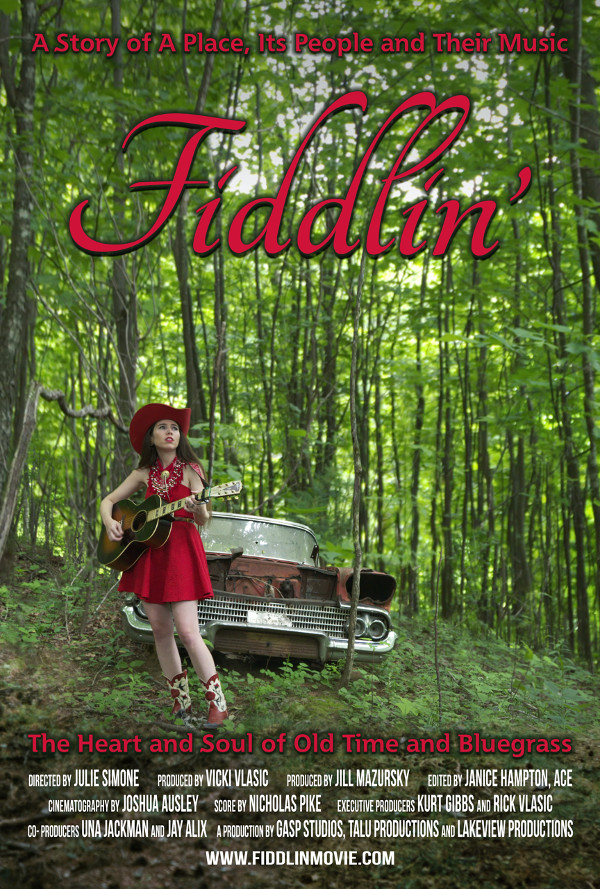
Fiddlin’ poster
Video: Fiddlin Films, Fort Lauderdale Int’l Film Festival (FLiFF)
Photos: Fiddlin Films
Sisters Julie Simone and Vicki Vlasic, natives of the Appalachian Mountains, returned home to film during the 80th Anniversary of the World’s Oldest and Largest Fiddler’s Convention, the first filmmakers permitted to do so in the history of the event. The result is Fiddlin’, an uplifting showcase of old time and bluegrass music and some of its musicians. The 96-minute film required two and a half years to make. It will premier in Florida at 6 p.m. November 14, 2018 at Savor Cinema Lauderdale as part of the Fort Lauderdale International Film Festival. Scroll down to watch a trailer.
“We wanted to shine a positive light on the true beauty of this area with it’s traditions, culture, music and authentic people,” said Simone, director, Fiddlin’, in an email about the making of the documentary. “Because we were a small crew, we threw cameras at our nieces and nephews, my mom cooked for everyone and my dad set up camp for us. This was a passion project and we all came together to make Fiddlin’ happen.”
They filmed with a budget below $500,000 in Galax, Virginia and other small towns in Southwest Virginia as well as in the Nashville, Tennessee area. Funding sources included a Kickstarter campaign, a grant from the Rogovy Foundation, donations from friends and family and the sisters.
“We recruited our family to help work on the project as well as hiring a DP and Audio Recordist from North Carolina,” said Vlasic, producer of the film, by email. “Our kids were holding booms, lights, carrying equipment and filming on additional cameras. Our parents cooked for the entire crew. Julie and I have worn many hats as we navigated the process of getting our film made.
Julie and I grew up in this Appalachian region and spent our summers attending the Old Fiddler’s Convention in the neighboring town of Galax. After living in major cities for many years, Julie realized that this cultural event that we had always taken for granted was worthy of sharing with a larger audience. We had also started noticing that in recent years, there had been an enormous change in the demographics of the festival-young kids were now playing the traditional music in droves. In our youth, the musicians were only older people. Even more inspiring was seeing that the young people were jamming and hanging out with their elders and carried instruments instead of smartphones.”

Musicians Ivy Phillips and Annabelle Watts
When asked to describe the music Vlasic said, “Old Time music was the music played in these mountains when the first settlers came from England, Ireland, Wales and Germany and began playing with the African slaves who introduced the banjo to our country. The combination of their music became known as Old Time music. In 1947, Bill Monroe and the Bluegrass Boys (so named as they came from the state of Kentucky) began to take breaks on individual instruments and to improvise and try to outdo the player before them. This was the birth of Bluegrass Music. Monroe’s brother started using picks on his fingers to play the banjo which also differentiated the sound from Old Time. Many consider Bluegrass to be a ‘fancier’ style of music with some licks borrowed from blues and jazz music. Bluegrass later evolved into rock and roll when Elvis Presley recorded Bill Monroe’s ‘Blue Moon of Kentucky’ as his first record. Country music was also born out of much of this Mountain music.”
Simone grew up on a farm in the Blue Ridge Mountains of Virginia. Prior to making the independent film she enrolled in a gorilla style film making class where she wrote, directed and acted in multiple short films. After motherhood and divorce, she turned her attention to the camera. On a trip to Cannes, Julie directed, filmed, and appeared as herself in Cannes Without a Plan, a comedic reality and television pilot about divorce and being a single mom.
Fiddlin’ had its world premiere in March 2018 at San Louis Obispo, California, where it won the Audience Award. It has won multiple awards to date. The Florida screening will be the final one this year. Next year, the producers expect to participate in more screenings and announce a release date.
Posted by Elena del Valle on October 31, 2018
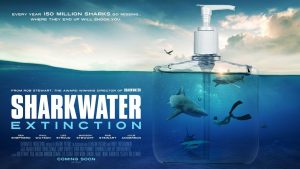
Sharkwater Extinction poster – click to enlarge
Video, photo: Courtesy of the Fort Lauderdale Int’l Film Festival (FLiFF)
Filmmaker Rob Stewart shines a light on the killing of sharks across borders in his third, and final, film Sharkwater Extinction. According to the film, worldwide between 100 and 150 million sharks, including endangered species and babies, are slaughtered for their flesh and fins every year, although only about half of them are reported. The Florida premier of the film will be at the Fort Lauderdale Int’l Film Festival (FLiFF) at 8 p.m. Saturday, November 17, 2018 at Bailey Hall, 3501 Davie Road, Davie, Florida (on the Broward College campus). Scroll down to watch a trailer.
In the documentary Stewart and other shark advocates travel to the often violent underworld of the pirate fishing trade in Florida and California as well as West Africa, Spain, Panama, Costa Rica and France. While in Florida they purchase various products at a grocery store and take them to Florida International University for testing. The scientists discover shark DNA in a number of them, including food, health and beauty products, fertilizer and pet food. In addition to beautiful underwater filmography with sharks the film features interviews with shark advocates, experts and locals as well as shaky undercover video.
In his first film, Sharkwater, Stewart brought attention to shark finning for use in shark fin soup. According to promotional materials, his multi award-winning film changed laws and public policy worldwide, and launched hundreds of conservation groups; more than 90 countries have banned shark finning or the trade of shark products.
Despite that unscrupulous fishermen fish sharks and equally unscrupulous buyers purchase them to make soups and much more so that, according to Stewart, they are still being fished to extinction. Stewart perished in a diving accident in the Florida Keys in January 2017 during the making of Sharkwater Extinction.
Posted by Elena del Valle on August 2, 2018

Theatrical one-sheet for Generation Wealth – click to enlarge
Photo, video: Lauren Greenfield, Amazon Studios
After 25 years as a photographer and filmmaker Lauren Greenfield became convinced that there was a theme to much of what she had observed. She felt a culture of wealth bound many of the images. She mounted a photographic exhibit of her work, published a book and released Generation Wealth, a 106-minute introspective film released via Amazon Studios. Scroll down to watch the film trailer.
The director and her family appear prominently in the film. She interviews them as well as people she knew in her high school years and the subjects of previous films and photography projects.
Questions about the film submitted via email to a representative remain unanswered as of this writing. The film was written by Greenfield who was also a producer. Frank Evers and Wallis Annenberg were also producers. Theater locations and additional information are available on the film website, generationwealthmovie.com
Greenfield is an Emmy-award-winning photographer, filmmaker, and chronicler of youth culture, gender, and consumerism. Other films by Greenfield include Queen of Versailles and Thin. The film was supported by a grant from the Sundance Institute Documentary Film Program with support from JustFilms and Ford Foundation Cinereach Project at Sundance Institute.
Posted by Elena del Valle on June 27, 2018
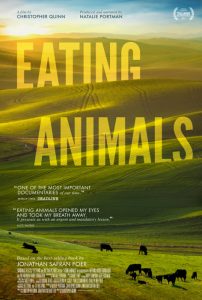
Eating Animals – click to enlarge
Photo, video: Courtesy of Sundance Selects. A Sundance Selects release.
Ever wonder where you eggs, dairy and meat come from? The makers of Eating Animals, a 94-minute film based on a book of the same title by Jonathan Safran Foer, went in search of answers. Over five years they visited farms, spoke with farmers, professors, industry experts, activists, and whistle blowers. They filmed in California, Nebraska, Iowa, North Carolina, China, Germany, India and Sweden. They imply that the factory farming practices of recent decades have degraded our humanity by making us part of the inhumane treatment of animals, polluted our environment and put our health in jeopardy. For animals lovers some scenes and images may be difficult to watch or forget. Scroll down to see film trailer.
Directed and produced by Christopher Quinn (Sundance award winner God Grew Tired of Us), the film was produced with Academy Award winner Natalie Portman (who also narrates it) and Foer. It indicates that nearly all Americans eat animals products produced in factory farms and that 30 states have passed Ag Gag laws to limit information and images of the harmful factory farming practices. The film opened in New York City June 15, 2018 and will roll out in theaters nationwide in the coming weeks. Information is available at the movie website Eatinganimalsmovie.com.
A statement about the film says: “Eating Animals aims to alter the very frame of public discussion about industrial agriculture and the future of meat, shifting media debates, minds, and markets alike. Moving past any sense that factory farming is a concern only for animal or environmental activists, we paint a vivid portrait of how industrial agriculture unraveled core national values and changed the world for the worse. The fight to end factory farming emerges not only as a fight to eliminate what may be the greatest crime against animal life ever committed, but as a commonsense and economic necessity.”
The film was made by Big Star Pictures in Association with Artemis Rising Foundation and The Neuman Family Foundation. Funding was provided by Obvious Group, LLC, Annenberg Foundation, Artemis Rising Foundation, Neuman Family Foundation, Jivan Fund, LLC, Simone Friedman, Samir and Puja Kaul and William Bettman.
According to promotional materials for the film the book Eating Animal is the only book in the category “animal rights” besides Peter Singer’s 1973 classic Animal Liberation that has remained a top ten Amazon bestseller since 2009; the U.S. version of the book has sold 400,000 copies and the book has become an international bestseller with language rights sold in 27 countries.
Click to buy Eating Animals
Posted by Elena del Valle on January 8, 2018

János Mészáros, author, Kings and Crosses
Photo: János Mészáros
A podcast interview with graphic novel author János Mészáros is available in the Podcast Section of Hispanic Marketing & Public Relations, HispanicMPR.com. During the podcast, he discusses Kings and Crosses with Elena del Valle, host of the HispanicMPR.com podcast.
János, who writes under the pen name Sinonimo, is owner of Libub Group Kereskedelmi És Zolgátató Kft. He spent over 20 years in management consultancy in Hungary and across Europe. Kings and Crosses is his first fiction work. He created the story and the story board for the graphic novel.
To listen to the interview, scroll down until you see “Podcast János Mészáros” on the right hand side, then select “HMPR ” and click on the play button below or download the MP3 file to your iPod or MP3 player to listen on the go, in your car or at home from the RSS feed. Some software will not allow flash, which may be necessary for the play button and podcast player. If that is your case, you will need to download the file to play it. To download it, click on the arrow of the recording you wish to copy and save it to disk. The podcast will remain listed in the January 2018 section of the podcast archive.
Posted by Elena del Valle on November 1, 2017

A scene from El Mercado de la Inocencia
Photo, video: Discovery en Español
At 10 p.m. E/P this Sunday November 5 Discovery en Español will air for the first time El Mercado de la Inocencia, a one hour Spanish language documentary (44 minutes of documentary) about sex tourism in Medellin, Colombia, as part of the Discovery a Fondo investigative programming block. The program, often featuring dark scenes filmed with what appear to be hidden cameras, focuses on the former drug trafficking and extreme violence destination now an international capital of sex tourism, including the sale of underage sex. Scroll down to watch a video clip in Spanish.
According to promotional materials, many of the illegal networks run by foreigners in the United States and Europe offer Medellin guided tours with underage prostitutes in their packages available for online purchase. Narrated and directed by David Beriain, a journalist and researcher known for his work on Clandestino’s, the project was headed by Michela Giorelli, Rafael Rodriguez and Carlos Cediel. The program was produced by 93 metros, an independent Spaniard production company, earlier this year and required six months to produce. A Discovery en Español spokesperson declined to share any information on production costs.
“No, we did another documentary about sex tourism in Cartagena a few years ago,” said Michela Giorelli, vice president, Production and Development Discovery Latam/USH, when asked by email via a publicist if this is the first time the network airs a documentary about sex tourism. “We have also explored the subject with ‘’Trata de mujeres: de Tenancingo a Nueva York’’, an Emmy Award winning documentary about sex trafficking that aired as part of Discovery a Fondo, the networks’s investigative programming block.” When asked if anyone in the film was compensated financially to participate (be video or audio taped or interviewed), she replied, “No, nobody is ever compensated in our investigative documentaries.”
According to the documentary, 24,000 people a day seek sex for sale in Medellin; and more than 90 percent of the sex workers in the city are drug addicted. Government officials and police appear on camera. Street scenes show scantily clad women. In some shots prostitutes with their identities concealed discuss their work and in others sex workers and customers can be seen from a distance. A spokesperson explained that “Most of the cameras were located in such places to protect the identity of interviewees and also to make sure we were getting the “real thing.’’ After November 5, 2017 the documentary should be available on the Go app. Discovery en Español.
Posted by Elena del Valle on August 7, 2017
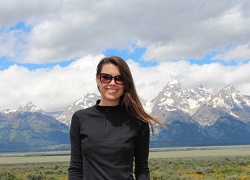
Hilary Linden, director, Indivisible
Photo: Kudzu Films
A podcast interview with Hilary Linder, director, Indivisible (see With video – New film showcases challenges faced by Dreamers) is available in the Podcast Section of Hispanic Marketing & Public Relations, HispanicMPR.com. During the podcast, she discusses her film with Elena del Valle, host of the HispanicMPR.com podcast.
Hilary combines her knowledge in the fields of international development and humanitarian relief with her passion for nonfiction storytelling as the director and producer of Indivisible. She is the founder and president of Kudzu Films, a production company dedicated to spreading social justice through film.
Hilary monitored humanitarian emergencies for USAID’s Office of U.S. Foreign Disaster Assistance and served as a programs manager at the Clinton Bush Haiti Fund, where she managed projects aimed at promoting job growth and smart, sustainable economic development. Hilary also has established education scholarships for children in Zimbabwe and Tanzania and conducted independent HIV/AIDS research in Rwanda. Indivisible follows three undocumented immigrants as they fight for a pathway to citizenship and a chance to reunite with family members.
To listen to the interview, click on the play button below, scroll down until you see “Podcast” on the right hand side, then select “HMPR Hilary Linder” and click on the play button below or download the MP3 file to your iPod or MP3 player to listen on the go, in your car or at home from the RSS feed. Some software will not allow flash, which may be necessary for the play button and podcast player. If that is your case, you will need to download the file to play it. To download it, click on the arrow of the recording you wish to copy and save it to disk. The podcast will remain listed in the August 2017 section of the podcast archive.
Posted by Elena del Valle on July 26, 2017

From Indivisible
Photo, video: Fuse, Kudzu Films
In February 2013, Hilary Linder began work on a project that would lead her to the making of her first film, Indivisible, in which she followed the lives of three undocumented immigrants for almost three years. The 78-minute documentary about three undocumented immigrants, screened in 25 film festivals already, will air on Fuse, a cable network, at 10 p.m. ET July 29, 2017. Scroll down to watch a trailer.

Renata, Evelyn and Antonio meet their relatives at the United States-Mexico border
“Renata, Evelyn, and Antonio were young children when their parents brought them to the U.S. in search of a better life; they were teenagers when their families were deported,” Linder said by email when asked to describe the film. “Today, they are known as Dreamers. Indivisible takes place at a pivotal moment in their lives, as they fight for a pathway to citizenship and a chance to be reunited with their loved ones.”
When asked about the goal of the film, she said: “I selected immigration reform as the focus of my first film because I believe it will shape the identity of the United States for generations to come and because I knew there was an incredible human story to tell. When Congress introduced a comprehensive immigration reform bill in 2013, I grew frustrated that media coverage was focusing on numbers and statistics rather than the actual people at the heart of the debate. Knowing that immigration reform is a highly politicized topic, I set out to make a film that would humanize the issue and that both undocumented and documented audiences could relate to—a film about families.”
In the United States she filmed in Massachusetts, New York City, Florida, and Arizona. Overseas, she filmed in Colombia, Brazil, and Mexico.
The documentary, funded mainly by the filmmaker with $30,000 of support she fundraised online and in person, premiered at the Cinequest Film Festival in March 2016.
”
The most common reaction is that they had no idea that families were being separated by deportation or what it is like for families to be separated, and, now that they know, they want to do something to change our immigration system and prevent this from happening,” Linder said when asked about people’s reaction to the film. “Before the election, many people indicated that the film had changed their mind about who they would vote for. And today, at such a scary time for immigrants in the U.S., audiences overwhelmingly ask what they can do to help. We like to direct people to our Take Action page on our website (indivisiblefilm.com/takeaction), where they can sign petitions, receive information about contacting their Members of Congress, and sign up to host their own screening of Indivisible.”
Posted by Elena del Valle on May 25, 2017

The Business of Recovery
Photos, video: The Business of Recovery
It took the filmmakers behind The Business of Recovery (thebusinessofrecovery.com/) four years to complete the 81-minute documentary targeting “The overwhelming number of people who have been affected by addiction…directly or indirectly.” In June of 2016, they released the film to the public via iTunes, Amazon and Google Play. It was recently screened at the Palm Beach Film Festival. Scroll down to watch a trailer of the film.
According to the Center for Disease Control, in 2015 some 88,000 people in the United States died of alcohol abuse and 47,000 died of a drug overdose. Every day 6,300 people seek addiction treatment at 14,000 treatment centers across the nation; and addiction treatment revenue has increased from $9 billion in 1986 to $34 billion in 2016 while drug overdose rates have tripled, according to The Business of Recovery.
Ninety percent of the centers base their treatments on Alcoholics Anonymous Twelve Steps principles despite abysmal rates of recidivism, according to the documentary. A spokesperson for the National Institute on Drug Abuse explains on camera that there is only anecdotal evidence of limited success for Alcoholics Anonymous treatment. At the same time, there are 60,000 sober living homes across the country with little or no regulation.
“Our goal in making The Business of Recovery was to demand the addiction treatment industry change the way addiction is treated in three primary areas: Better educated and medically licensed professionals in charge of addiction treatment, Regulations to protect the patient and align addiction treatment facilities with medical standards, the use of scientifically proven treatments (empirical, not evidence based),” said Greg Horvath, producer of the film, by email.
He and a close friend financed the documentary, which cost less than one million dollars to make. The producers spoke to hundreds of people, interviewed over 60 families, addiction experts, treatment providers, doctors, and scientists from across the United States.
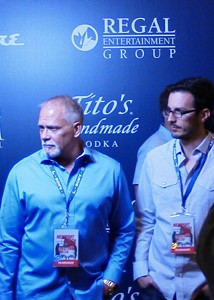
Greg Horvath, producer, and Adam Finberg, director, The Business of Recovery at the Newport Beach Film Festival
“The toughest challenge was assembling the enormous amount of information we gathered and create a film that would help educate people that for as ‘medical’ as the addiction treatment industry sounds and acts, it lacks most if not all of the rigors of science that are applied to medical treatments,” Horvath said when asked about the greatest challenge and biggest reward of the film project. “And it is all but absent of regulations to protect the patient and align addiction treatment facilities with medical standards. The greatest reward has been the ground swell of public support the film has received, and to see some aspects of the industry slowly starting to change.”
When asked what marketing strategies they had used to promote the film he said, “Our strategy was to create public interest in the film thru film festivals and other screenings. The Business of Recovery premiered at the Newport Beach Film Festival to three sold-out audiences and has been screened across the United States (and Canada) to many other sold-out audiences at film festivals, prestigious post-secondary institutions (including Columbia University Medical School in NY, UC Irvine School of Medicine and School of Law in CA, and Spalding University, School of Professional Psychology in KY, to name a few), and many other public and private screenings. As well, it was one of only four films invited to screen at the International Drug Policy Reform Conference in Washington, DC.”
Click to buy The Business of Recovery
Posted by Elena del Valle on May 1, 2017

Filmmaker Dana Ziyasheva
Photo: Dana Ziyasheva
A podcast interview with filmmaker Dana Ziyasheva, is available in the Podcast Section of Hispanic Marketing & Public Relations, HispanicMPR.com. During the podcast, she discusses the film Defenders of Life (see With video – New film addresses underage marriage among indigenous people) with Elena del Valle, host of the HispanicMPR.com podcast.
Dana, born in Almaty, Kazakhstan, in 1972, dreamed of becoming a writer and filmmaker. But in the Soviet Union of her childhood, opportunities for a middle-class Kazakh girl from the empire’s outskirts to make a career in cinema were virtually nonexistent. Instead Dana graduated from Kazakh State University and became a television journalist in the field covering police patrols as well as natural and political disasters.
In 1994, she used her fellowship at the Central European University in Prague, Czech Republic, to foray into Western Europe. No one, not even the Kazakh government, could believe it when the United Nations Educational, Scientific and Cultural Organization in Paris offered her a position as the youngest and first-ever international civil servant from Kazakhstan. Despite initial disapproval from her own government, Dana spent the next 20 years working for the UN in Paris, Iraq, China and Costa Rica. Between missions, negotiating with governments and implementation of international conventions and UN Plans of Action, she was involved in audiovisual projects with Central China TV and China Film Group.
To listen to the interview, click on the play button below, scroll down until you see “Podcast” on the right hand side, then select “HMPR Dana Ziyasheva” and click on the play button below or download the MP3 file to your iPod or MP3 player to listen on the go, in your car or at home from the RSS feed. Some software will not allow flash, which may be necessary for the play button and podcast player. If that is your case, you will need to download the file to play it. To download it, click on the arrow of the recording you wish to copy and save it to disk. The podcast will remain listed in the April 2017 section of the podcast archive.
![]()
![]()























